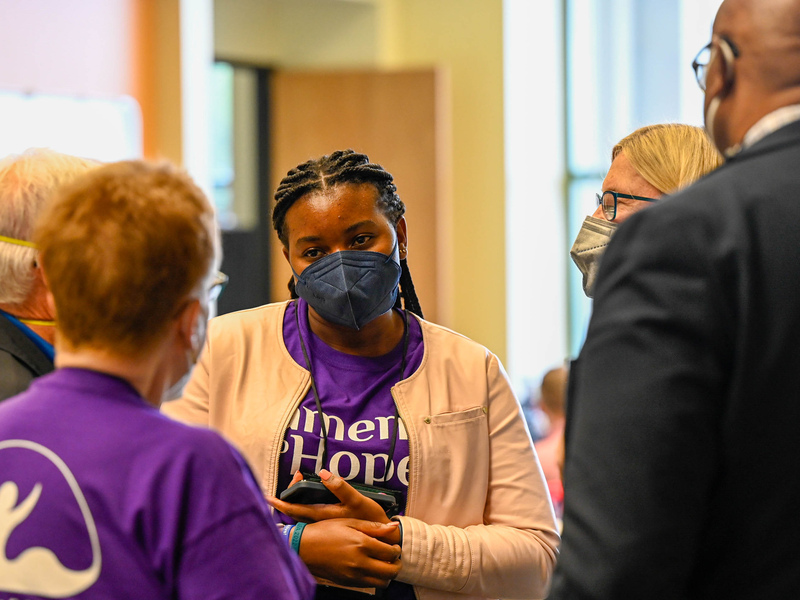
Young Adult Advisory Delegate Gayelle Sama participated in a small-group discussion during the General Assembly Ministry Coordination Committee meeting. The fourth and final round of committee meetings at the 225th General Assembly of the Presbyterian Church (U.S.A.) started June 30, 2022 at the Presbyterian Center in Louisville, Kentucky. (Photo by Rich Copley)

Young Adult Advisory Delegate Gayelle Sama participated in a small-group discussion during the General Assembly Ministry Coordination Committee meeting. The fourth and final round of committee meetings at the 225th General Assembly of the Presbyterian Church (U.S.A.) started June 30, 2022 at the Presbyterian Center in Louisville, Kentucky. (Photo by Rich Copley)
The Ministry Coordination Committee voted Friday to recommend that the next General Assembly be conducted in a hybrid format with online committee meetings and in-person plenaries.
The 21–16 vote on the 226th General Assembly in Salt Lake City took place after the committee split into groups to study four possible formats and give presentations to the full committee on their assigned options.
The format of the Presbyterian Church (U.S.A.)’s biennial gathering has been the topic of much discussion since the arrival of Covid, which resulted in a completely online Assembly in 2020, with a greatly scaled-back agenda, and this year’s first-ever hybrid Assembly, a three-week affair with in-person committees in Louisville and online plenaries.
As the GA Ministry Coordination Committee studied options Thursday and Friday, the Committee on the Office of the General Assembly (COGA) helped the process along by providing resource people and breakdowns of multiple formats, including costs, drawbacks, prioritized values and other details.
COGA also laid out several considerations, such as fiscal responsibility; Earth stewardship; the reality of declining membership; technological advances; values, such as equity, inclusion and accessibility; and reclaiming the meaning of the Church. But COGA stressed that it wanted the Ministry Coordination Committee to come up with its own recommendation.
When it came time to vote on GA-MC-15 motions, multiple options, including totally online and totally in person, were rejected. Then Commissioner Stephen Mabie of New Hope Presbytery explained why he thought it would be good to go with the $2.8 million Omega option (online committee meetings and in-person plenaries).
In addition to not wanting to lose deposits that already have been paid in Salt Lake City, there would be the “ability for committees to be able to build community, which was one of our values,” he said. “The initial plenaries, where you elect the moderators, would be online, because it wouldn't be cost-effective, of course, to bring people in for two days, and then the big plenary would be at the end of the session. That’s what I think would be a good mix.”
In response to a question about the proposed committee setup and how personal time might be affected, Dave Davis of COGA said, “It seems to me there is flexibility for COGA to design the online committee meetings in a way that would best minimize or maximize (the time), depending on how you look at that” and “respond to the concerns that have been expressed.”
Commissioner Heather McIntyre, a teaching elder from the Presbytery of Charlotte, spoke in favor of the motion, citing flexibility and inclusivity. It would allow “people in my position to get away from the church for a smaller amount of time, but then have a committee setup in which we can have more flexibility on whether to have shorter meetings over a longer space of time.”
.jpeg)
General Assembly Ministry Coordination Committee Moderator Anne Wilson used plastic hand clappers to bring her committee to order. The fourth and final round of committee meetings at the 225th General Assembly of the Presbyterian Church (U.S.A.) started June 30, 2022 at the Presbyterian Center in Louisville, Kentucky.(Photo by Rich Copley)
.jpeg)
General Assembly Ministry Coordination Committee Moderator Anne Wilson used plastic hand clappers to bring her committee to order. The fourth and final round of committee meetings at the 225th General Assembly of the Presbyterian Church (U.S.A.) started June 30, 2022 at the Presbyterian Center in Louisville, Kentucky.(Photo by Rich Copley)
"Also, this option would reduce (the) burden of child care for younger pastors and families,” McIntyre said.
Commissioner Charles Weaver questioned whether plenaries needed to be in person, saying, “I think the need for inclusivity, the need for sensitivity, is in this room. Not that it’s not needed in plenary, but I think it’s harder to do it, and more important to do it, here.”
After the final vote, COGA was asked whether commissioners would be the only ones to attend GA or if the local community could come to worship service, for example. Deputy Stated Clerk Kerry Rice said that remains to be seen, noting various factors, including what’s going on with Covid.
Earlier in the day, the Ministry Coordination Committee heard remarks from Stated Clerk the Rev. Dr. J. Herbert Nelson, II, and powered its way through multiple items of business. (Find details at pc-biz.org).
The committee, which wrapped a day early, had a spirited discussion about a portion of GA-MC-04, also known as “On Renaming the Advocacy Committee for Women’s Concerns.” The item, which was ultimately approved, calls for changing ACWC’s name to the Advocacy Committee for Women and Gender Justice to better reflect its current scope.
Most of the questions centered on a portion of the item that says, “Urge the Presbyterian Mission Agency to expand the office of advocacy committee support and the role of advocacy in the PC(USA).”
Some committee members thought the line was unclear, and others felt it was unnecessary because the Ministerial Coordination Committee had voted the day before in favor of creating an LGBTQIA+ Equity Advocacy Committee and additional staffing (GA-MC-05).
